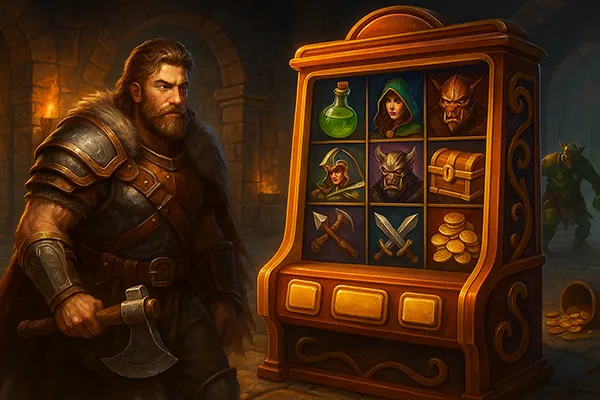
The world of online slot games continues to evolve, and one of the most intriguing recent trends is the integration of RPG (Role-Playing Game) elements. This hybrid approach combines traditional slot mechanics with story progression, character development, and immersive narratives. In 2025, these RPG-style slots are becoming increasingly popular, offering players not only the thrill of spinning reels but also a sense of purpose and progression beyond simple luck.
The concept of gamification in slot development has been around for several years, but its transformation into a fully narrative-driven experience marks a new chapter. Modern players seek engagement that extends beyond mere spins. They want to feel part of a story, unlocking achievements, completing missions, and improving their virtual avatars. This design approach increases player retention and satisfaction by merging gameplay depth with reward systems.
Developers are leveraging storytelling and progression systems to encourage players to return and continue their adventures. Games like *Dungeon Immortal Evil* by Evoplay and *Max Quest: Wrath of Ra* by Betsoft illustrate this shift. Both titles feature interactive environments, character progression, and battle sequences, offering experiences reminiscent of classic RPGs but grounded in slot mechanics. These elements make each session unique, turning casual spins into meaningful gameplay moments.
In 2025, more studios are embracing this hybrid format, recognising the appeal of interactive experiences. This change reflects the growing influence of video game design within the online gambling industry, where creativity and player engagement are at the forefront of development strategy.
In RPG-style slots, traditional reels are only part of the experience. Players progress through levels, unlock skills, and sometimes battle digital foes. Each spin contributes to a larger journey rather than serving as an isolated event. The introduction of XP systems, quests, and in-game currencies creates an environment that feels dynamic and rewarding.
For example, in *Dungeon Immortal Evil*, players explore different environments after each spin, facing monsters and collecting loot. This structure mirrors the sense of exploration and reward typical in RPGs. Similarly, *Max Quest* replaces spinning reels entirely with interactive combat, where each bullet fired substitutes a reel symbol. These mechanics keep players engaged while maintaining the core principles of slot play.
This blend of entertainment and interactivity redefines what a slot game can be. It appeals not only to casino enthusiasts but also to video game players who value story and progression. By making gameplay outcomes part of a narrative, developers bridge the gap between chance and skill-based experiences.
Progression is one of the most effective tools for retaining players. When users feel that their actions lead to visible development—such as levelling up a character or unlocking new challenges—they are more likely to stay invested. This psychological connection is central to the success of RPG mechanics in slots. It transforms short gaming sessions into long-term experiences.
Developers also implement reward systems that reinforce engagement. For instance, completing daily missions or earning achievements can grant players bonus spins, in-game currency, or access to exclusive storylines. This constant sense of advancement taps into the motivational psychology found in mainstream gaming and strengthens brand loyalty.
Moreover, the social aspect of these games is becoming more pronounced. Some titles allow players to compare their progress, scores, or unlocked items with others. This competitive dimension further enhances replayability and builds community interaction, a factor that traditional slot formats often lack.
The technical advancements enabling RPG-style slots are significant. Game engines like Unity and Unreal now allow developers to create immersive 3D worlds with high interactivity. Combined with blockchain-based reward systems and AI-driven storytelling, 2025 marks a turning point where personalised and dynamic experiences are the standard rather than the exception.
Artificial intelligence is increasingly used to adapt storylines and challenges to each player’s behaviour. This means no two gaming sessions are identical, and users experience a tailored narrative flow. The integration of adaptive difficulty, progression tracking, and randomised missions keeps gameplay engaging without overwhelming casual players.
At the same time, regulatory frameworks continue to evolve, ensuring these games remain transparent and fair. Developers are working closely with gaming authorities to maintain player trust, ensuring that skill elements do not undermine the random nature of gambling outcomes. This balance between innovation and fairness defines the credibility of this new generation of slot experiences.

The success of RPG-inspired slots indicates a broader transformation across the gambling industry. Studios are increasingly focusing on narrative depth, player identity, and immersive world-building. These factors appeal to a generation of players raised on interactive entertainment, where progression is as satisfying as winning.
As 2025 progresses, we can expect to see new releases that blur the boundaries between gaming genres even further. Developers may introduce cooperative or competitive multiplayer components, deeper customisation systems, and expanded storylines. The use of augmented and virtual reality may also elevate immersion to unprecedented levels.
Ultimately, RPG slots represent a future where gameplay variety and user engagement redefine player expectations. This evolution is not just about visuals or mechanics—it’s about reshaping how players connect with digital entertainment, combining strategy, chance, and narrative into one cohesive experience.
The adoption of RPG elements in slot design is more than a passing experiment. It reflects a strategic shift towards sustainable engagement models. Developers aim to offer lasting entertainment that appeals to both casual and dedicated audiences. These hybrid experiences build loyalty by rewarding time and curiosity, not just luck.
Industry experts predict that by the end of 2025, hybrid slot games will represent a significant share of new releases. Their versatility makes them suitable for diverse audiences, from traditional players seeking something fresh to younger generations drawn by interactive storytelling. This convergence of gaming cultures is likely to shape the industry for years to come.
In summary, slots with RPG elements illustrate how innovation and creativity can transform a familiar format into something deeply engaging. Through character progression, quests, and evolving narratives, developers are turning the simple act of spinning reels into an ongoing digital adventure.